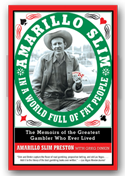
I can’t say that I expected great things from the memoirs of a man who divided his life between the ranch, the pool table, and the poker table, and while it can’t be called great, Amarillo Slim in a World Full of Fat People is a surprisingly enjoyable diversion.
From his early days as a pool hustler and USO performer to his days on the road with Doyle Brunson and Sailor Roberts and his eventual victory in the World Series of Poker, Amarillo Slim surely led a memoir-worthy life. With the help of co-author Greg Dinkin, he shares his tales of daring hustles, outrageous proposition bets, and near-death experiences with both humor and humility.
Even accounting for Dinkin’s likely contributions, there’s no doubt that Slim is a great storyteller and an all-around smart guy. As one would expect from a professional hustler, he’s particularly sharp when it comes to human psychology. The book is full of advice about gambling and astute observations about human behavior, usually in the form of a moral to one of Slim’s countless gambling stories. As he puts it, “Gambling is a reflection of life. A man’s true character comes out when he’s sitting at the poker table- his strengths and weaknesses, his good traits and his faults. Whenever money is involved, you see the worst in people.” Slim even makes a few apt references to Freud, whom he calls “Ol’ Siggy.”
The forced Texas dialect mostly fades into the background, though it can get distracting at times: “Now, ordinarily, I’d rather see early frost on my peach trees than write some book giving away my secrets to success, but, as I said, I’ve got seven grandbabies- six fillies and one baby boy- and it’s about time they learned my life story. So grab yourself a cup of coffee and hold on to your britches. I’m fixing to tell you a few things that I’ve been keeping to myself for a lot of years.”
Slim’s book does a lot to combat negative stereotypes about gamblers. He doesn’t claim to be a paragon of virtue, but he convincingly argues that for a professional gambler, good behavior is good business: “Remember what I said about being able to shear a sheep mana time but only being able to skin it onces. It sounds corny, and it is corny, but it works. Be good to people- treat them nice and they’ll want to gamble with you again.” Slim also makes clear that his professional reputation and kind nature helped to extricate him from some sticky situations along the way.
That said, Slim’s is not exactly a coherent ethics. He cops to and apologizes for some of his transgressions, including fixing the 1948 GI Baseball World Series, though he doesn’t mention making any effort to return anyone’s money. There were other cases, though, that struck me as shady but that the author treats as business as usual.
Despite his rural Texan’s suspicion of contracts and fast-talking lawyers, Slim seems to regard deliberate deception and sometimes even outright cheating as just part of the game. In other words, it’s your job to triple-check the wording of any bet you make and to inspect the deck yourself, because if you don’t, your opponent has the right to take every angle he can.
While it can be rewarding to see Slim turn a hustler’s angle back on him or fleece a cheater at his own game, it’s a little shocking to see some of the ways in which he relieves friends and strangers alike of their money. For example, he famously accepts a bet with a world champion Ping Pong player on the condition that he be allowed to choose the paddles. Not even the best player in the world can beat Slim at Ping Pong played with a frying pan with which the hustler’s been practicing for the past month. In Slim’s defense, though, his fellow gamblers seem willing to accept that they were hustled “fair and square”, and in the rare case that the author gets hustled, he’s quick to pay up himself.
This, in a nutshell, seems to be Slim’s life philosophy and the message he wishes to impart to his readers: kindness and honesty are generally good business, but in the end, it’s get or get gotten and every man has got to look out for himself and his family first. Think what you will about that message, because the author isn’t so much proselytizing as reminiscing, but know that when you’re riding alongside Amarillo Slim, the getting is always good.

“Not even the best player in the world can beat Slim at Ping Pong played with a frying pan with which the hustler’s been practicing for the past month.”
Hahahaha frying pan? I can’t quite believe that story altogether, but the frying pan part is priceless. The book does seem interesting to read. Looks like a fun read, I’ll be sure to check it out when I can. By the way, is it just me.. or does it seem like Slim’s the kind of person who could hustle his best friend with a smile?
Well, I don’t think it’s giving too much away to tell you that Slim does in fact hustle his best friends.
And re: the frying pan thing, he later gets a second guy to agree to the same bet. The guy has heard about the first bet and secretly practiced with a frying pan. But Slim assumes the guy will have heard about it, so this time he chooses Coke bottle. Talk about getting leveled!